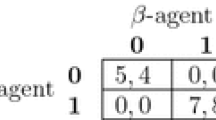Summary
Gains from coordination provide incentives for delay. In this paper, the extent of delay is studied in a dynamic,N-person, coordination game. There is no social gain from delay, so an equilibrium with delay is always inefficient. For fixedN, there is no coordination failure when the period length is short: all equilibrium outcomes converge to the Pareto efficient outcome as the period length converges to zero. On the other hand, holding period length fixed, there exist equilibria in which delay is proportional toN, for arbitrarily large values ofN. In addition, it can be shown that the possibility of delay depends on the “timing” of strategic complementarities. However, under certain conditions, delay is shown to be a robust phenomenon, in the sense that “well-behaved” equilibria exhibit infinite delay forN sufficiently large.
Similar content being viewed by others
References
Admati, A., Perry, M.: Joint projects without commitment. Rev. Econ. Stud.58, 159–276 (1991)
Bliss, B., Nalebuff, B.: Dragon-slaying and ballrom dancing: the private supply of a public good. J. Publ. Econ.25, 1–12 (1984)
Bolton, P., Farrell, J.: Decentralization, duplication and delay, J. Polit. Econ.98, 801–826 (1990)
Bryant, J.: A simple rational expectations Keynes-type model. Quart. J. Econ.97, 525–529 (1983)
Caplin, A., Leahy, J.: Business as usual, market crashes and wisdom after the fact. Columbia University, unpublished (1992)
Chamley, C., Gale, D.: Information revelation and strategic delay in a model of investment. Econometrica, forthcoming (1994)
Chatterjee, S., Cooper, R.: Multiplicity of equilibria and fluctuations in dynamic perfectly competitive economies. AEA Papers Proc.79, 353–357 (1989)
Chatterjee, S., Cooper, R., Ravikumar, B.: Participation dynamics: sunspots and cycles. NBER Working Paper Series No. 3438 (1990)
Cooper, R., John, A.: Coordinating coordination failures in a Keynesian model. Quart. J. Econ.103, 441–464 (1988)
Diamond, P.: Aggregate demand management in search equilibrium. J. Polit. Econ.90, 881–894 (1982)
Durlauf, S.: Non-ergodic growth theory. Rev. Econ. Stud.60, 349–366 (1993)
Farrell, J., Saloner, G.: Standardization, compatibility and innovation. Rand J. Econ.16, 70–83 (1985)
Farrell, J.: Cheap talk, coordination and delay. Rand J. Econ.18, 34–39 (1987)
Farrell, J., Saloner, G.: Coordination through committees and markets. Rand J. Econ.19, 235–252 (1988)
Farrell, J.: Choosing the rules for formal standardization. UC Berkeley, unpublished (1993)
Fernandez, R., Glazer, J.: Striking for a bargain between two completely informed agents. Amer. Econ. Rev.81, 240–252 (1991)
Gale, D.: Dynamic coordination games. Boston University, unpublished (1992)
Gul, F., Sonnenschein, H.: On delay in bargaining with one-sided uncertainty. Econometrica56, 81–95 (1988)
Heller, W.: Coordination failure under complete markets with application to effective demand. In: Heller, W., Starr, R., Starrett, D. (eds.) Equilibrium analysis: essays in honor of Kenneth J. Arrow, vol. II. Cambridge: Cambridge University Press 1986
Krugman, P.: History versus expectations. Quart. J. Econ.106, 651–667 (1991)
Jéhiel, P., Moldovanu, B.: Cyclical delay in bargaining with externalities. University of Bonn, unpublished (1992)
Ma, A., Manov, M.: Bargaining with deadlines and imperfect player control. Econometrica61, 1313–1340 (1993)
Matsuyma, K.: Increasing returns, industrialization and indeterminacy of equilibrium. Quart. J. Econ.106, 617–650 (1991)
Rauch, J.: Does history matter only when it matters little? the case of city industry location. Quart. J. Econ.108, 843–867 (1993)
Rubinstein, A.: Perfect equilibrium in a bargaining model. Econometrica50, 97–110 (1982)
Shaked, A.: Opting out: bazaars vs “high tech” markets. London School of Economics, STICERD Discussion Paper (1987)
Shleifer, A.: Implementation cycles. J. Polit. Econ.94, 1163–1190 (1986)
Author information
Authors and Affiliations
Additional information
This paper grew out of discussions with Christophe Chamley. While writing it I benefited from discussions with Ken Binmore, Russell Cooper, Bob Rosenthal and Michael Manove. Joe Farrell, Drew Fudenberg, Martin Hellwig and Sawoong Kang made very useful comments on an earlier version that led to substantial improvements. Helpful comments were also made by seminar participants at the London School of Economics, the SUNY at Stoney Brook, the NBER Summer Institute, Northwestern University, and the University of Chicago. I would like to thank Nick Yannelis and an anonymous referee for their editorial advice. Financial support for this research was provided by the National Science Foundation under Grant No. SES 9196061.
Rights and permissions
About this article
Cite this article
Gale, D. Dynamic coordination games. Econ Theory 5, 1–18 (1995). https://doi.org/10.1007/BF01213641
Received:
Revised:
Issue Date:
DOI: https://doi.org/10.1007/BF01213641




